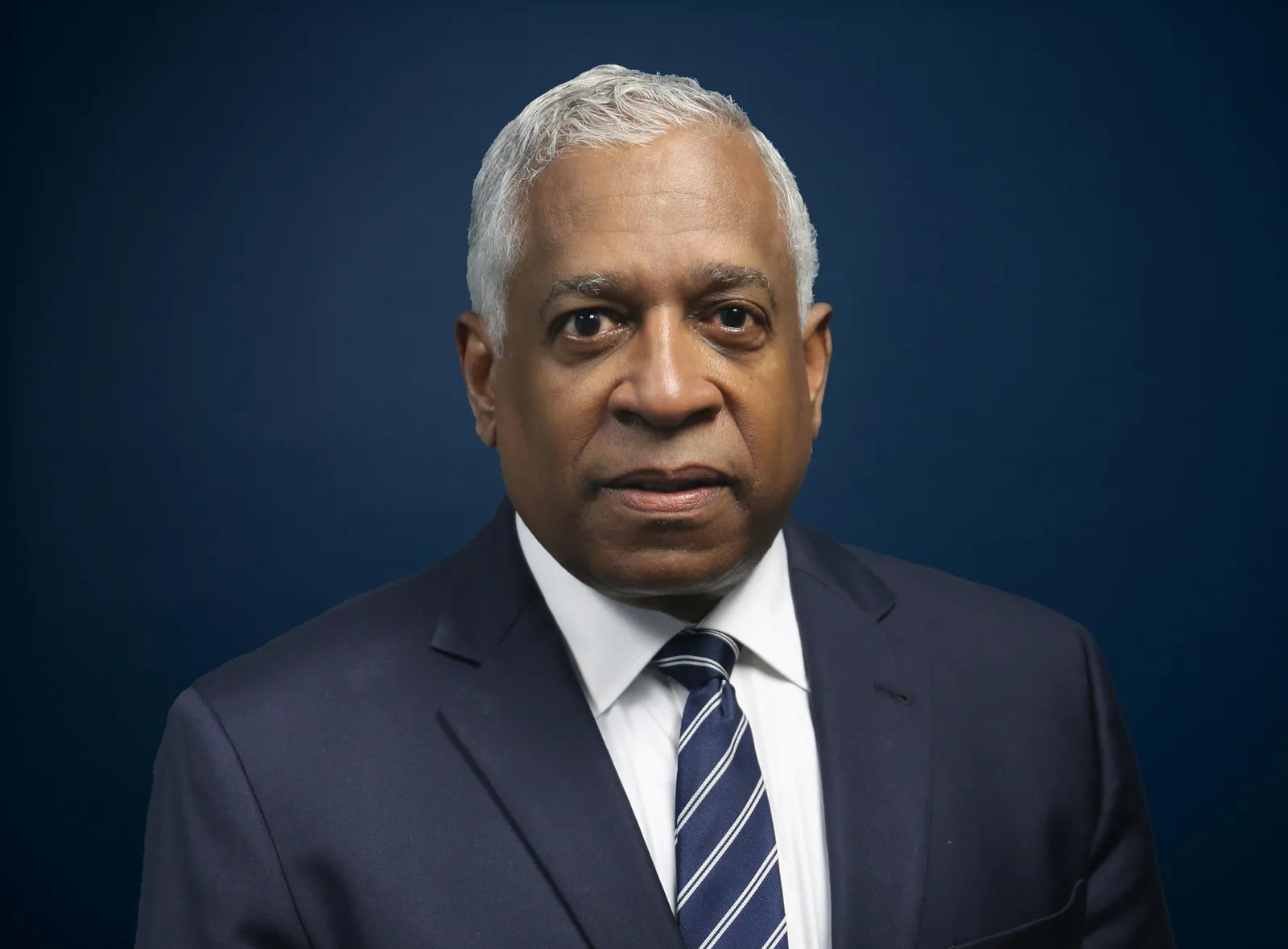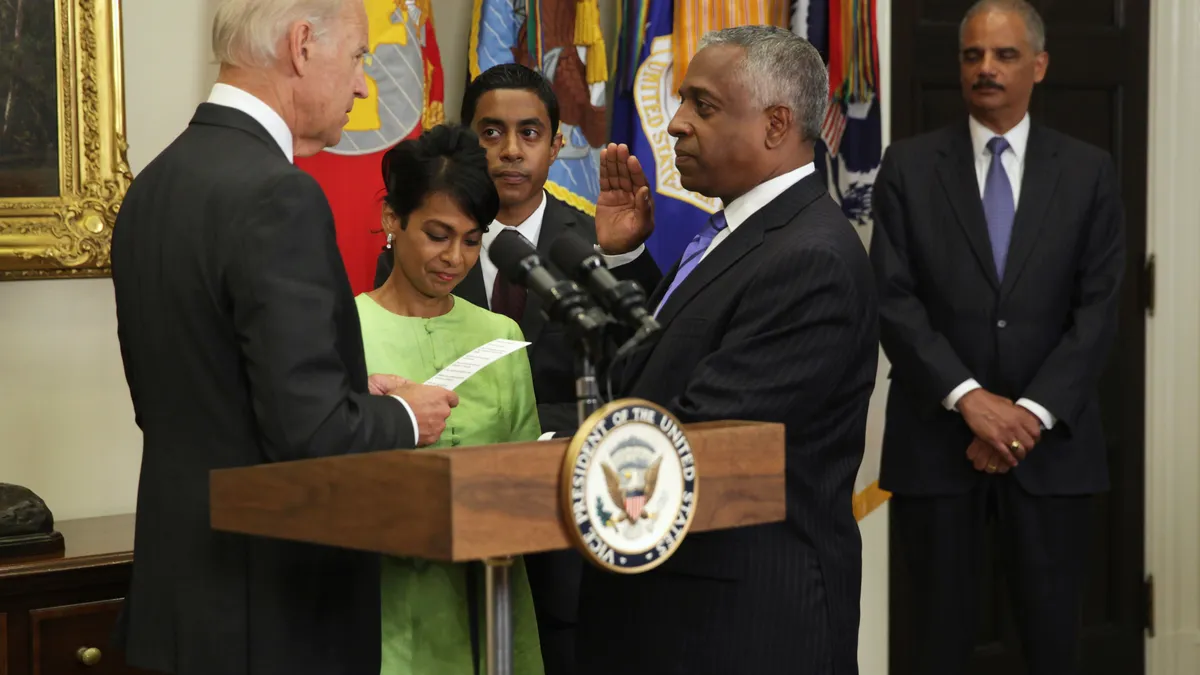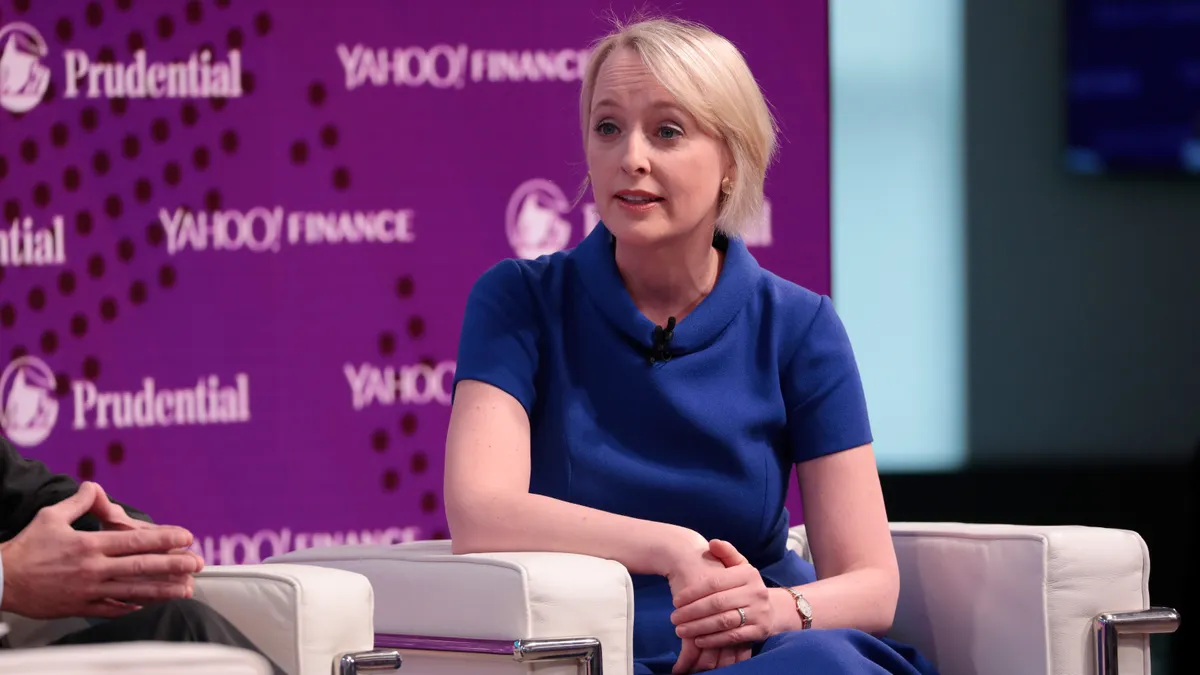Few attorneys have the breadth of career experiences as B. Todd Jones. After law school at the University of Minnesota, Jones joined the Marine Corps seeking a quicker path toward litigation experience as a Marine Judge Advocate. He found the Marines suited him and veered into a more traditional infantry role, deploying as an officer to Asia, before resuming his military legal career.
Jones later served two stints as U.S. Attorney in Minnesota during the Clinton and Obama administrations. In 2013, he became the first Senate-confirmed leader of the Bureau of Alcohol, Tobacco, Firearms and Explosives.
Jones most recently spent nine years at the National Football League as a senior vice president and special counsel charged with overseeing policies on player misconduct and reducing off-field incidents. He was hired only months after a video of Baltimore Ravens running back Ray Rice assaulting his fiancee at a New Jersey hotel in 2014 forced the league to alter its player-misconduct policies.
Jones joined litigation firm Robins Kaplan earlier this month as a partner. It’s his second stint at the firm.
Editor’s note: Legal Dive’s conversation with Jones has been edited for clarity and length.
LEGAL DIVE: What was your role with the National Football League, and what made you return to your former firm?
B. TODD JONES: I joined the NFL in 2015 right from ATF, and I had been living in D.C. for three years, so I was doing a long-distance commute between Minnesota, where I lived, and D.C. Post-COVID, the league was one of the early adopters of return to work, simply given the nature of its business. And so for me, it was just the long-distance commute becoming difficult.

You were the first legal executive in that NFL job. What was the organization seeking from the role and what were some of your objectives?
I think the objective was to tighten up internal processes and bring more of a methodology to player off-field misconduct. I was brought in in a new role as special counsel for conduct in light of events of the previous year, primarily Ray Rice. There were several other high-profile cases, not good for the brand, not good for the families of the players, not good for the league. And so the owners made a decision to form a conduct committee with a half dozen owners, and they wanted in-house, full-time help on that.
Was there previously no formal NFL process for misconduct?
It's all tied in with the collective bargaining agreement with the players because they are unionized. And of course, the players are the high-profile folks that, when things happen, they get the press. If it’s somebody who’s the groundskeeper at a club facility that gets the DUI, that’s not making national news. And so there were processes in place from the CBA that were sometimes unclear if you were in the drug space or if you were in the DUI space. There was a process — do X, get Y — in terms of suspensions or fines, but it was less defined when it was personal conduct off-field, off-season.
Obviously the Ray Rice case revealed vulnerabilities and a lack of consistency with respect to discipline that had been imposed in other places. It was one of those things where it was not really on the public radar until the [elevator] video came out and showed up on TMZ, and then everyone was taken aback by the nature of that video and the violence it showed in a very public way.
[Commissioner Roger Goodell] had already looked at it — not looked at the video, but looked at the matter — and given Ray Rice a two-game suspension. When people learned that, they were, like, ‘What? For that?’ So there was a lot of legal drama about trying to impose additional discipline. And that's when you run into difficulties with the CBA and labor law. The long and short of it is, they wanted to avoid that. So one of the things that I was tasked with was to construct the history so that we had some foundational stuff with respect to similar crimes. It's almost like constructing sentencing guidelines.
We did a lot of data capture. We constructed a lot of training to look at who the vulnerable populations were in the league. It’s primarily second, third, fourth year players who seem to have more challenges off field. We did some training and visited every club in the spring to play a part in rookie transition programs so that people fully understood choices and consequences. We did investigations internally. Sometimes we rode the coattails of the criminal process, but oftentimes there would be no criminal charges, but the league would still impose [consequences] on players for certain types of conduct, particularly domestic violence. Unfortunately, a fair amount of domestic violence incidents happen in the off season, less during the season.
What was the players’ union position on the work you were doing?
There was resistance. In the early days, we were still operating under the 2011 CBA and so there were some labor law, legal questions about the commissioner’s authority, my authority, what the league could and couldn’t do. It was contentious at times while we were building this out. But that all changed in 2020 with the new CBA, which has provisions in it designating somebody that is different from me as the joint disciplinary officer, and if we couldn’t resolve an issue with respect to discipline and consequences, then there was this alternative of going to a third party, not an arbitrator, designated by the CBA who would hear the matter and make a determination. Since 2020, we’ve only had to use this once, and that was in the Deshaun Watson matter, where we had to go to the joint disciplinary officer and have a full blown hearing.
You’ve also spent many years in U.S. politics. This presidential election offers a stark divide in the proposed policies from a Harris administration or a second Trump term. What would you advise a company on how to prepare for what seems to be enormous policy differences?
If I were to give any kind of advice to general counsel, I would say look at your compliance programs. Look at your anti-money laundering programs. Look at how you deal with your vendors. Ask questions of your cybersecurity team, if you’re not already. Have a connection with cybersecurity processes, both for the leakage of information and for the protection of your systems. If you’ve got a touch point with a federal or a state government regulatory entity, and have a compliance program, make sure it’s for real. Because if you don't look at that regularly, and make sure it's real, it’s going to bite you.
Anticipate and plan for the worst. Make sure that it is a real plan in terms of your contingency. Don’t stick your head in the sand. And if you have a plan, make sure it’s vibrant. If you don’t have one, make sure you get one. Maybe the level of rigor with which compliance will be enforced in a Trump administration will [drop], just turn into free will and nobody cares about anything except the bottom line. I’m showing my political stripes, but I did serve in two Democratic administrations.
If it's a Democratic administration, it won't necessarily be a continuation of the Biden Department of Justice view. There are clues that would indicate the antitrust function at DOJ will probably get an injection of adrenaline, that the FTC will get an injection of adrenaline. When a candidate talks about price gouging and price fixing, there are tools in the box that the feds have that will be effective, both as a deterrent and as an incentive. One of the things that I understand has atrophied is the self-reporting in the antitrust field and the amnesty program. People don’t think there’s enough of an incentive to report anti-competitive behavior and save themselves in terms of the amnesty program. I also understand that DOJ, at the antitrust division, and the Federal Trade Commission look at each other and try to decide what’s going on, who’s going to do what. And so I have no doubt that [antitrust] will become more vibrant.
You raised an interesting point about the unknown in a second Trump administration. Some people think it might be akin to the first term, a version of a traditional Republican administration. Do you see that? Or something new?
If there’s going to be a void at the federal level, if there is a backing off, and an effort to deconstruct the federal government as we know it, there will be a cut back on the regulatory reach of DOJ and the Securities and Exchange Commission. People should not forget that in our republic, state attorneys general will fill that space. That creates a whole set of challenges for industries and companies that operate in multiple places. Have no doubt that attorneys general will fill that void, if the federal government backs off in a Republican administration.
For a regulated company or industry, it seems there are advantages and disadvantages in that scenario. Which would be preferable?
It's easier said than done with respect to deconstructing the regulatory setups and agencies across the federal government. You’re not going to have the SEC go away overnight. I mean, irrespective of Supreme Court decisions about federal regulation, who knows what's going to happen on the congressional side? We’re not going to be able to deconstruct the SEC, the FTC, the Consumer Financial Protection Bureau. Those federal agencies are not going to go away overnight despite all the rhetoric. There are limitations to what you can do in a four-year cycle. Trump has already served four years. He’s going to be a lame duck if he wins office the minute he’s elected. He’s got four years to do it, and even the most skilled bureaucrat will be unable to deconstruct the federal government in the ways that people talk about. And some of those agencies are quasi-independent. They’ve got boards that have terms that will not overlap. So in one scenario you have a steady state and a little bit of backing off on regulation. In another, you have a change of focus and increased activity in certain places.
What is artificial intelligence likely to mean in terms of the amount of litigation arising from this technology? Will AI be helpful in reducing litigation expense or does it bring additional uncertainty and new litigation?
It’s interesting you ask that because you know this firm that I am rejoining is primarily a trial shop. And AI will never replace 12 or six people in a box or an arbitration panel. And in the end, it’s going to be eyeball-to-eyeball contact, that persuasive advocacy and storytelling. And AI, at least, from what I've seen in my limited reentry into the private law field, the domain with litigation and trial advocacy, it’s a hell of a tool to help you organize and search for and use information, because in the end, in litigation and trials, it's who can find the information, who can organize it, who can present it and is it persuasive? AI, as a tool, is going to be invaluable. It’s also going to enhance the risk in terms of protecting your assets, and the assets are increasingly your information and that ties in with the cyber issues involved.
What got you interested in law school and a legal career?
I’ve had quite the ride in my life. I went to law school at the University of Minnesota, joined the Marine Corps for six years with the intention of being a judge advocate, where I learned how to be a trial lawyer. I ended up serving as an infantry officer for half that time. So I did not practice law, but I learned a lot about leadership and ended up doing judge advocacy.
I moved back to Minnesota in the 1990s, where I became an assistant U.S. attorney, which was an easy transition to make, because coming from the Marine Corps was primarily criminal law, criminal investigations. I went to a small law firm here and ended up going back as the U.S. attorney at the end of the1990s as a political position that went away after the election of 2000. I arrived at Robins and spent the first decade at Robins, building a white collar practice and doing some of the things that we've talked about.
And then when President Obama was elected, I came back. There was an opportunity and a request to come back as U.S. attorney, and I did that. And in the middle of my 10 years as U.S. attorney, there was an incident over at ATF called Fast and Furious, which was a gun walking scandal. The AG let go of the director of ATF and asked me to serve as the acting director, which I did, not thinking to stay there. And then Sandy Hook happened. And it was really a moment in my professional life where, as somebody in law enforcement, I thought that I should work harder to have ATF fulfill its mission and actually became the first confirmed director. I think that’s the only bone [Congress] threw President Obama. Post Sandy Hook, no universal background checks, no red flag laws, none of that other stuff. But, okay, we’ll confirm a director at ATF.
Why did you become a lawyer as opposed to some other career?
It was natural for me. I grew up in Cincinnati and I came to Minnesota to go to a small liberal arts college called Macalester College, and it was a socially active college campus in the late 1970s. I worked on Jimmy Carter's presidential campaign. I majored in political science and history. I took a year off to think about whether or not to go to law school. It seemed like the next logical step, and I wanted to be a trial lawyer. That's not the kind of job that you get right out of law school, even if you do moot court stuff, which is how I ended up looking at the military and the judge advocate program as a way to learn skills and be a trial lawyer. But then I got bit by the Marine Corps, and wanted to be a real Marine.
The Marine Corps has a unique matriculation process for its lawyers, where every Marine officer has to go through the same training for six months. And that's basically infantry officer training, whether you're going to be a pilot or logistician or even a lawyer. You go through the same six months at Quantico. I loved it. I loved the challenge. I dropped my law contract and went in as an infantry officer, and actually got to be a platoon commander, company commander, and deployed to Okinawa and Korea. We had three kids. Military life and family life sometimes don’t mix. So we decided to get out in 1989 and come back to Minnesota.



















